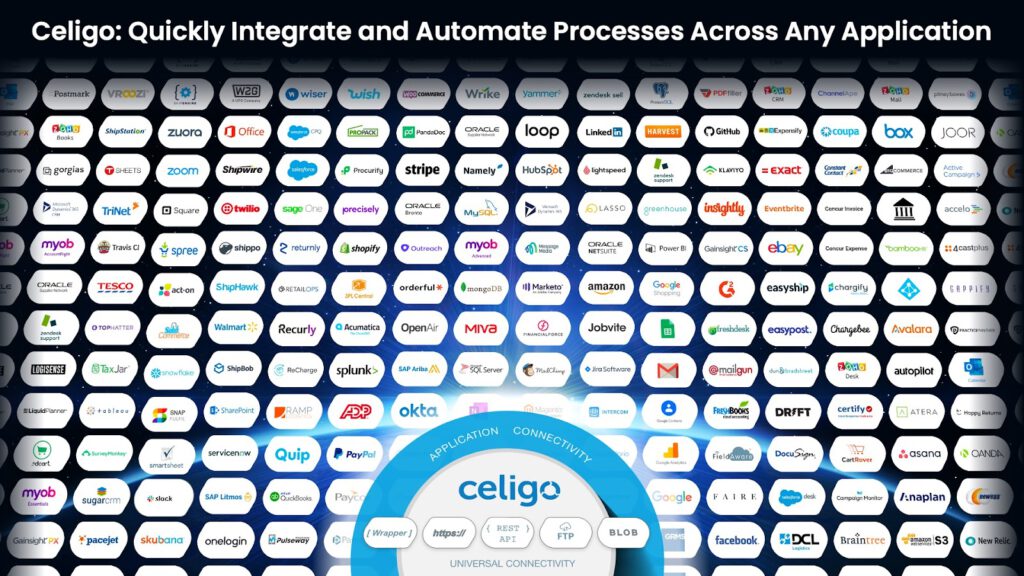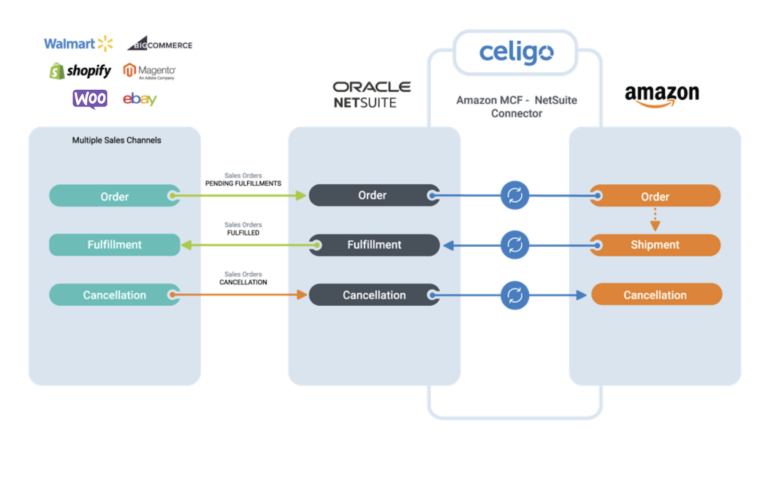Companies today work with a variety of different software systems, from e-mail clients and spreadsheets to task and project management software to ERP systems, tax and banking programs, or individual solutions from suppliers, logistics, or financial service providers.
Within NetSuite, there are many ways to customise data and processes through Custom Records, Saved Searches, Workflows, and Scripts.
To exchange data with other software systems as well, “iPaaS” is well-suited as a control center. “iPaaS” stands for “Integration Platform as a Service”. It can be used to develop mappings, configurations, and workflows. Data is exchanged between NetSuite and other applications in the appropriate format at specified times.
In conjunction with NetSuite, no other vendor makes integrating data with third-party systems as easy as Celigo. That’s why we are an official partner of Celigo, a now global company based in California’s Silicon Valley that has been in the market since 2010.
The NetSuite connector was the first “smart connector” Celigo ever built. Since then, Celigo has been closely associated with NetSuite, but it has also diversified its focus. However, the niche connection to NetSuite is still apparent.
Specifically for NetSuite, Celigo has nearly two dozen fully functional, out-of-the-box Smart Connectors, over 50 templates, and 70 app wizards. If you want to integrate NetSuite, Celigo is arguably the best option.

In addition, there are universal connectors for generic services, such as REST APIs, (S)FTP servers, and HTTP webhooks, so almost any individual requirement can be mastered. In this way, the automated exchange of data between applications, customers, suppliers, and partners is successful.
Celigo’s elastic cloud platform called integrator.io was designed as a streaming platform and supports large data volumes and complex workflows between applications.
The creation and configuration of data integrations are handled by staff specifically certified by us for the Celigo platform. Scalability, high availability, and regular updates on the part of Celigo also ensure time and thus cost savings.
One of the biggest advantages of modern iPaaS solutions is the high degree of visualization. This ensures a user-friendly operation and gives even less experienced users the possibility to get an overview of the process flows. Most settings can be configured via drag-and-drop or dropdowns and input fields. Once an integration has been set up by us, it will also be possible for your staff to adjust settings and eliminate any errors via the visual error management tool.

Successful e-commerce companies often sell their products via various web stores and trading platforms. A typical combination of sales channels is, for example, the use of Amazon, eBay, and own Shopify web store.
To provide sales orders, stock levels, returns, etc. centrally in NetSuite, Celigo’s ready-to-use integration apps can be used. After appropriate configuration, the data exchange between these platforms and NetSuite runs fully automatically and almost in real-time. The “flows” can update data every 15 minutes.
The logistics service provider of a mail order company, for example, sends a daily email including an attached CSV file with current data on executed shipments, the number of packages, destination region, etc. To be able to analyze this data statistically, for example, it is made available in a separate table in NetSuite so that own “saved searches” can be executed on it.
Process automation is needed so that the data does not have to be read manually every day by hand and via CSV upload.
At this point, we resort to Celigo’s iPaas solution where we can create a so-called “flow”. Daily, it scans the corresponding email inbox for messages that originate from the shipping service provider and have a CSV file with a certain name attached. The file is then read, and each row is transformed into a record object that is transferred to the appropriate table in NetSuite.
Similarly, many processes can be automated. It does not matter between which platforms data is exchanged, whether it is databases, HTTP API, (S)FTP servers, emails, or online storage – everything is possible.
Your registration has been successfully recorded. You will receive a confirmation email shortly. If you do not receive it, please check your spam folder.
If you have any questions, we are always happy to assist you. You can reach us at marketing@altavia.de.
Ihre Anmeldung wurde erfolgreich registriert. In Kürze erhalten Sie eine Bestätigungs-E-Mail. Falls Sie diese nicht erhalten, prüfen Sie bitte Ihren SPAM-Ordner.
Falls Sie Fragen haben, stehen wir Ihnen jederzeit gerne zur Verfügung. Sie erreichen uns unter marketing@altavia.de
Your registration has been successfully recorded. You will receive a confirmation email shortly. If you do not receive it, please check your SPAM folder. If you have any questions, we are always happy to assist you. You can reach us at marketing@altavia.de
Ihre Anmeldung wurde erfolgreich registriert. In Kürze erhalten Sie eine Bestätigungs-E-Mail. Falls Sie diese nicht erhalten, prüfen Sie bitte Ihren SPAM-Ordner.
Falls Sie Fragen haben, stehen wir Ihnen jederzeit gerne zur Verfügung. Sie erreichen uns unter marketing@altavia.de
 ×
×
You are currently viewing a placeholder content from Vimeo. To access the actual content, click the button below. Please note that doing so will share data with third-party providers.
More InformationYou are currently viewing a placeholder content from YouTube. To access the actual content, click the button below. Please note that doing so will share data with third-party providers.
More InformationYou need to load content from reCAPTCHA to submit the form. Please note that doing so will share data with third-party providers.
More Information